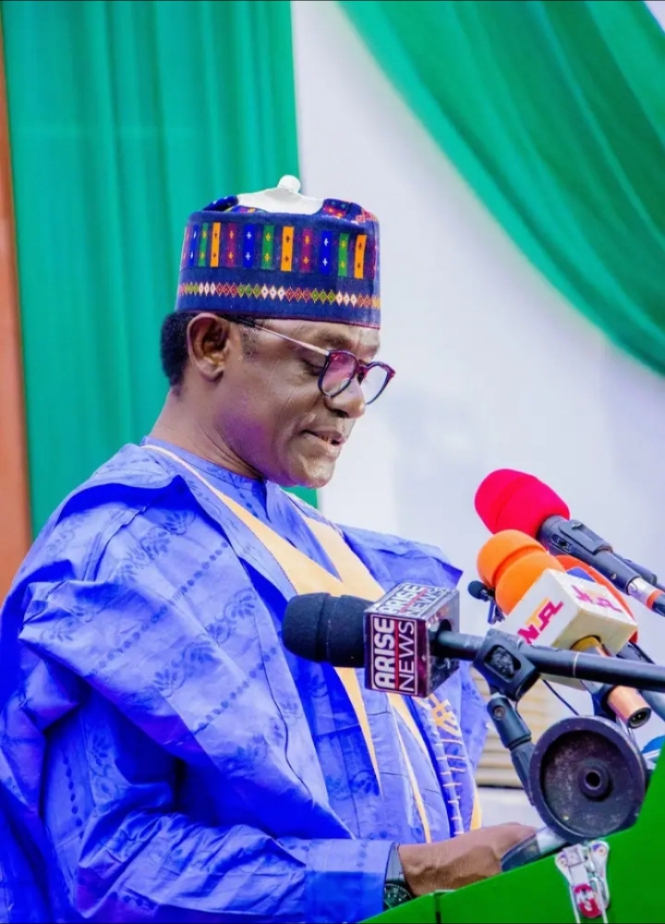By: Abdullahi Inuwa
From despair to determination, from violence to victory—Yobe State is turning the page on insecurity, thanks to a quiet revolution led by Governor Mai Mala Buni.
In a region once overrun by fear, residents are reclaiming their lives, their lands, and their future. Markets are booming, farms are thriving, and children are once again laughing in classrooms.
Yobe’s journey from a conflict zone to one of Nigeria’s safest northern states didn’t happen by chance—it’s the result of strategic planning, political will, and strong collaboration between government and security agencies. At the heart of this turnaround is the commitment of Governor Buni, who has made security his top priority.
From Damaturu to Buni Yadi, Potiskum to Geidam, once-troubled towns are now experiencing renewed stability. Governor Buni’s administration has taken a comprehensive approach to tackling insecurity—combining kinetic operations with non-kinetic interventions like education, healthcare, youth empowerment, and community engagement.
“We refused to accept fear as a way of life,” Governor Buni said at a recent stakeholders’ meeting in Damaturu. “Our people deserve peace, and we’re delivering it with action, not just words.”
Brigadier General Dahiru Abdulsalam (Rtd): Quiet Force Behind the Security Framework
While the governor provides leadership and vision, one man working behind the scenes has helped shape the new security architecture: Brigadier General Dahiru Abdulsalam (Rtd), Senior Special Assistant on Security Matters to the Governor.
A seasoned military strategist with years of frontline experience, Brig. Gen. Abdulsalam has been instrumental in coordinating intelligence, strengthening collaboration between security agencies, and setting up grassroots vigilante networks that complement the work of the military and police.
“Yobe’s security turnaround isn’t magic,” he noted during a recent briefing. “It’s a result of strategic planning, community trust, and the governor’s full support.”
Brig. Gen. Abdulsalam has also played a vital role in crisis response, such as when false rumors spread in March that Boko Haram had issued eviction threats in Gujba. He swiftly dismissed the claims, reassuring residents that no such threat existed and that Yobe remained firmly under control.
Perhaps one of the most daring moves by the Buni administration has been the integration of 390 repentant Boko Haram members, including 54 Yobe indigenes, who completed the federal government’s de-radicalization and rehabilitation program.
While some viewed this with skepticism, Governor Buni saw an opportunity to rebuild communities from within. With careful screening and post-reintegration monitoring, these former insurgents are being given a second chance—many of them now working in agriculture or skills-based trades.
“Most of them were victims of manipulation, not criminals by choice,” said Brig. Gen. Abdulsalam. “By offering reintegration, we’re not just disarming fighters—we’re disarming future threats.”
For years, towns like Malamdunari, Gulani, and Buni Yadi were ghost settlements. Today, they are being revived with government-funded reconstruction projects, safe return programs, and economic grants. Homes, schools, health centers, and markets are springing back to life.
Governor Buni has personally supervised these projects, ensuring displaced persons return home with dignity. The administration has also strengthened logistics for security patrols in remote areas to maintain peace in resettled communities.
The state has trained and equipped hundreds of community-based vigilantes—men and women who know the terrain and culture. These local agents, working in partnership with formal security forces, have helped foil attacks, track suspects, and build public confidence in rural areas.
“Community policing isn’t just an idea in Yobe—it’s real, and it’s working,” Brig. Gen. Abdulsalam noted. “It gives our people a sense of ownership in securing their land.”
Knowing that idle hands are vulnerable to radicalization, the Buni-led government has made youth empowerment a cornerstone of its peace strategy. Thousands of young people have been enrolled in skill acquisition centers, provided with startup funds, or engaged in agricultural cooperatives.
Governor Buni often says: “A productive youth is a peaceful youth.” And indeed, crime and recruitment by extremist groups have dropped significantly in areas with active youth programs.
In a powerful move to revive the state’s economy and protect vulnerable households, Governor Buni launched a ₦15.3 billion agricultural stimulus package. Over 5,300 farmers received tractors, fertilizers, solar pumps, seeds, and other equipment to boost food production.
Brig. Gen. Abdulsalam praised the initiative, stating, “Every crop harvested is a blow to hunger—and to the ideology of violence.”
Peace doesn’t last without services. That’s why the Buni administration has prioritized human capital development. Over 140 primary healthcare centers have been built across the state, alongside a 300-bed maternal and child health hospital in Damaturu. Ambulance tricycles and medical outreach programs now serve remote communities.
On the education front, over 4,000 new teachers have been hired, schools renovated, and millions spent on scholarships and examination fees. Children displaced by conflict are now back in school with dignity and hope.
From rural roads to solar-powered boreholes, from market hubs to housing schemes, the signs of progress are everywhere in Yobe. And behind the stability is a governor who understands that true peace is built—not imposed.
Governor Buni’s partnership with experts like Brigadier General Dahiru Abdulsalam (Rtd) has made Yobe one of the most improved states in terms of security and post-conflict recovery in Nigeria.
As the governor recently declared:
“We are not just fighting insecurity. We are fighting hopelessness. And we are winning.”
QsConclusion: A New Chapter for Yobe
Yobe is no longer a state in survival mode. It is now a land of second chances, of rebuilt dreams, and of enduring peace. Through visionary leadership, strategic security frameworks, and the unrelenting work of loyal officers like Brig. Gen. Dahiru Abdulsalam, the state has moved from the headlines of despair to the headlines of development.
Yobe’s story is far from over—but today, it’s a story worth celebrating.
Abdullahi Inuwa Social Commentator ainuwa303@gmail.com




